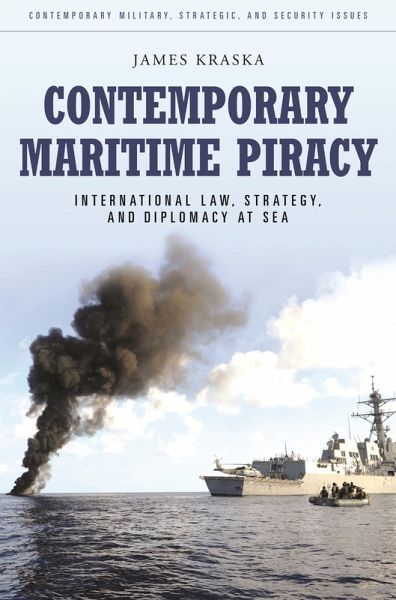
Contemporary Maritime Piracy (eBook, ePUB)
International Law, Strategy, and Diplomacy at Sea
Versandkostenfrei!
Sofort per Download lieferbar
37,95 €
inkl. MwSt.
Weitere Ausgaben:

PAYBACK Punkte
19 °P sammeln!
This volume provides a concise introduction to the issues and debates regarding modern piracy, including naval operations, law, and diplomacy, and focuses on the recent surge of attacks off the coasts of Africa and Asia. In the past decade, the incidence of maritime piracy has exploded. The first three months of 2011 were the worst ever, with 18 ships hijacked, 344 crew taken hostage, and 7 crew members murdered. The four Americans on board the sailing vessel Quest were shot at point-blank range. The economic costs are also staggering, reaching $7 to $12 billion per year, as insurance costs sk...
This volume provides a concise introduction to the issues and debates regarding modern piracy, including naval operations, law, and diplomacy, and focuses on the recent surge of attacks off the coasts of Africa and Asia. In the past decade, the incidence of maritime piracy has exploded. The first three months of 2011 were the worst ever, with 18 ships hijacked, 344 crew taken hostage, and 7 crew members murdered. The four Americans on board the sailing vessel Quest were shot at point-blank range. The economic costs are also staggering, reaching $7 to $12 billion per year, as insurance costs skyrocket, ransoms double and then quadruple, and ships are forced to hire armed security for protection. Pirates operating off the Horn of Africa disrupt shipping traffic through the strategic Suez Canal, siphoning transit fees from an unstable Egypt, while the seizure of supertankers in the Indian Ocean underscores the vulnerability of the world's oil supply. Governments, private industry, and international organizations have mobilized to address the threat. This is the first volume to examine their work in developing naval strategy, international law and diplomacy, and industry guidelines to suppress contemporary maritime piracy. Contemporary Maritime Piracy: International Law, Strategy, and Diplomacy at Sea comprises three sections, the first of which contains chapters on historical and contemporary piracy, international law and diplomacy, and coalition strategies for combating future piracy. The second and third parts provide collections of historic profiles and relevant documents.













